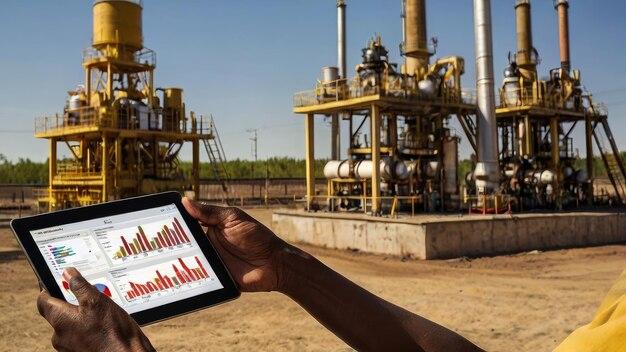Energy Optimisation in Oil Refineries: Efficiency and Management Practices 29th September – 3rd October 2025
- Description
- Reviews
Course Overview
This 5-day course provides a comprehensive exploration of energy optimisation techniques specifically tailored to oil refinery operations. It covers key concepts in refinery energy efficiency, from fundamental energy balance to advanced techniques like heat integration and equipment-specific optimisation. The course is designed for refinery engineers, energy managers, and technical professionals involved in improving energy use and reducing costs within refinery operations. Participants will gain practical skills to enhance energy efficiency, increase profitability, and comply with environmental standards.
Course Objectives
By the end of this course, participants will be able to:
-
Understand the core principles of energy efficiency and its direct impact on refinery profitability.
-
Perform energy benchmarking and identify opportunities for energy improvement in refinery operations.
-
Apply strategies to optimise energy use in key refinery process units.
-
Improve utility system performance, including steam and power generation.
-
Implement process heat integration and pinch technology to enhance energy savings.
-
Optimise the performance of refinery equipment to reduce energy consumption and increase operational efficiency.
Target Audience
-
Refinery engineers and energy managers seeking to improve energy efficiency and reduce operational costs.
-
Process engineers working in refinery operations and interested in energy management practices.
-
Technical professionals responsible for the design and optimisation of refinery utilities and systems.
-
Sustainability and environmental professionals focused on improving energy consumption and emissions in refinery operations.
-
Operations managers looking for practical solutions to enhance refinery energy performance.
Daily Agenda
Day One: Introduction to Energy Efficiency; the Effect of Energy on the Bottom Line
-
Energy and Its Effect on Refinery Profitability: Understanding how energy use impacts refinery costs, margins, and overall profitability.
-
Refinery Energy Balance: Principles of energy balance and its role in refinery operations.
-
Energy Benchmarking: Methods for assessing refinery energy performance and comparing it to industry standards.
-
Site Efficiency Assessment: Tools and techniques for evaluating energy performance at the refinery level.
-
Potential for Improvement: Identifying areas where energy consumption can be reduced and operational efficiency improved.
-
Approach to Energy Saving: Structured approaches to achieving energy savings, including setting targets and monitoring performance.
-
Fuel, Power, and Steam Costing Methodology: Techniques for cost allocation and understanding the financial implications of energy use in refineries.
Day Two: Energy Features of Refinery Key Process Units and How to Improve Their Energy Efficiency
-
Distillation Units: Energy-saving strategies for Crude Units and Vacuum Units, focusing on distillation efficiency.
-
Binary Distillation Columns: Techniques for improving the efficiency of binary distillation processes.
-
Hydrotreating, Distillate, and Naphtha: Identifying energy optimisation opportunities in hydrotreating and other refining processes.
-
Catalytic Reforming: Methods for improving energy efficiency in catalytic reforming units.
-
Fluid Catalytic Cracking (FCC): Approaches to improving energy efficiency in FCC operations.
-
Hydrocracking: Energy management strategies for hydrocracking units and their role in refining energy efficiency.
Day Three: Refinery Utility System
-
Steam Systems: Optimising steam generation, distribution, and consumption in the refinery.
-
Power Generation: Overview of power generation technologies and their role in energy efficiency.
-
Steam Turbines, Cycles, Efficiencies: Key factors affecting the performance of steam turbines, including cycle analysis and efficiency improvement.
-
Gas Turbines: Evaluating the role of gas turbines in refinery power generation and energy efficiency.
-
Cogeneration and Its Benefits: Understanding cogeneration systems and their potential to reduce energy costs and improve overall efficiency.
-
Optimisation of Steam & Power System: Best practices for enhancing the performance and efficiency of steam and power generation systems.
Day Four: Process Heat Integration
-
How Heat Integration Works: Basic principles of heat integration and its application in refining processes.
-
Introduction to Pinch Technology: Understanding pinch technology and its role in identifying energy savings opportunities.
-
Heat Availability Curves and Energy Targeting: How to create heat availability curves and set energy targets for the refinery.
-
Pinch Technology for Refinery Operators: Practical application of pinch technology to optimise heat integration and reduce energy consumption.
-
Retrofitting Heat Exchange Networks for Improved Performance: Strategies for upgrading existing heat exchange networks to increase energy efficiency.
-
Intuitive vs. Systematic Network Revamp: Exploring both intuitive and systematic approaches to heat integration network improvement.
Day Five: Equipment Efficiency; Effective Energy Management
-
Fired Heaters: Techniques to optimise the energy efficiency of fired heaters and combustion processes.
-
Rotating Equipment: Best practices for maintaining and optimising the performance of rotating equipment such as pumps and compressors.
-
Heat Exchangers: Identifying and implementing energy-saving measures for heat exchangers.
-
Energy-Focused Organisation: Creating an organisational culture focused on energy management and optimisation.
-
The Energy Team: Building and managing an effective team responsible for driving energy efficiency initiatives.
-
Developing Internal Competence in Energy: Approaches to building internal expertise in energy management and optimisation within the refinery.
Why Choose this Course?
This course offers a comprehensive approach to refinery energy optimisation, equipping participants with the skills and knowledge required to improve energy efficiency across key refinery operations. Through practical insights, case studies, and in-depth exploration of cutting-edge technologies, participants will be able to implement energy-saving strategies that reduce costs, improve performance, and align with environmental regulations.
Learning Outcomes
Upon successful completion of the course, participants will:
-
Have a comprehensive understanding of energy efficiency principles and their impact on refinery profitability.
-
Be able to benchmark energy use, assess performance, and identify opportunities for improvement.
-
Gain practical knowledge of energy optimisation in refinery process units and utilities.
-
Be skilled in implementing heat integration strategies using pinch technology.
-
Know how to optimise equipment performance for improved energy efficiency.
-
Develop the capability to lead energy management initiatives within refinery operations.





